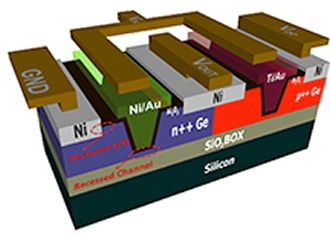 Chips today use complementary metal oxide semiconductor (CMOS) based on purified silicon substrates to do their magic work.
Chips today use complementary metal oxide semiconductor (CMOS) based on purified silicon substrates to do their magic work.
But scientists at Purdue University claim to have created the first modern germanium circuit that cuts silicon out of the equation.
The first transistor, created by Bell Labs, used purified germanium cooked up in the Purdue labs in 1947. That was superseded by silicon but as devices get tinier and tinier, silicon is reaching the end of its long innings, according to Peide Ye, a professor at Purdue.
He said: “The industry will soon reach the limit as to how small silicon transistors can be made, threatening future advances. Germanium is one material being considered to replace silicon because it could let the industry make smaller transistors and more compact integrated circuits.”
Ye said germanium has other advances over silicon, including the ability to make superfast circuits.
Ye didn’t talk about the price of germanium. Chips made by giants like Intel use purified silicon but ultimately based on sand. And sand is cheap.






